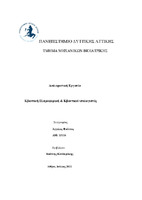| dc.contributor.advisor | Kandarakis, Ioannis | |
| dc.contributor.author | Φούντας, Άγγελος | |
| dc.date.accessioned | 2021-10-22T07:03:34Z | |
| dc.date.available | 2021-10-22T07:03:34Z | |
| dc.date.issued | 2021-10-21 | |
| dc.identifier.uri | https://polynoe.lib.uniwa.gr/xmlui/handle/11400/1405 | |
| dc.identifier.uri | http://dx.doi.org/10.26265/polynoe-1256 | |
| dc.description.abstract | Η παρακάτω εργασία έχει ως θέμα την Κβαντική Πληροφορική και τους Κβαντικούς
Υπολογιστές. Αρχικά στο πρώτο κεφάλαιο, θα μιλήσουμε για την Κβαντική Πληροφορική.
Πιο συγκεκριμένα, αρχικά θα κάνουμε μια ιστορική αναδρομή για το θέμα της Κβαντικής
Πληροφορικής. Έπειτα, θα μιλήσουμε για την Κβαντική Πληροφορική και την Κβαντική
Μηχανική και πως τέθηκαν τα θεμέλια της Κβαντικής Πληροφορικής. Θα αναλύσουμε το
πέρασμα από τη Κβαντική Μηχανική στην Κβαντική Θεωρία Πληροφόρησης, όπου εκεί
κλείνει και το κεφάλαιό μας.
Στο δεύτερο κεφάλαιο της εργασίας, θα μιλήσουμε για τους Κβαντικούς Υπολογιστές. Στο
πρώτο υπόκεφάλαιο, θα μιλήσουμε για την έννοια του Κβαντικού Υπολογιστή και στη
συνέχεια για τη δομή και την λειτουργία των Κβαντικών Υπολογιστών. Θα εξηγήσουμε τι
σημαίνει Κβαντική Πύλη αλλά και ποια είναι τα πλεονεκτήματα του Κβαντικού
Υπολογιστή έναντι του κλασικού. Κλείνοντας το κεφάλαιο, θα αναφερθούμε στην
Κβαντική Διόρθωση Σφαλμάτων.
Στο τρίτο και τελευταίο κεφάλαιο της εργασίας μας, θα αναλύσουμε την προσέγγιση της
θεωρίας. Πιο συγκεκριμένα, θα γίνει σαφής η προσέγγιση της θεωρίας της Κβαντικής
Πληροφορικής αλλά και η σχέση της θεωρίας της Κβαντικής Πληροφορικής και
Κβαντικής Μηχανικής | el |
| dc.format.extent | 113 | el |
| dc.language.iso | el | el |
| dc.publisher | Πανεπιστήμιο Δυτικής Αττικής | el |
| dc.rights | Αναφορά Δημιουργού - Μη Εμπορική Χρήση - Παρόμοια Διανομή 4.0 Διεθνές | * |
| dc.rights.uri | https://creativecommons.org/licenses/by-nc-sa/4.0/deed.el | * |
| dc.subject | Quantum computers | el |
| dc.subject | Quantum mechanics | el |
| dc.subject | Quantum gates | el |
| dc.title | Κβαντική πληροφορική & κβαντικοί υπολογιστές | el |
| dc.title.alternative | Quantum computing & quantum computers | el |
| dc.type | Διπλωματική εργασία | el |
| dc.contributor.committee | Michail, Christos | |
| dc.contributor.committee | Kalyvas, Nektarios | |
| dc.contributor.faculty | Σχολή Μηχανικών | el |
| dc.contributor.department | Τμήμα Μηχανικών Βιοϊατρικής | el |
| dc.description.abstracttranslated | The following work is on Quantum Informatics and Quantum Computers. First in the first
chapter, we will talk about quantum computing. More specifically, we will first make a
historical review of the subject of quantum computing. Next, we will talk about quantum
computing and quantum mechanics and how the foundations of quantum computing were
laid. We will analyze the transition from quantum mechanics to quantum information
theory, where our chapter ends.
In the second chapter of the work, we will talk about quantum computers. In the first
subchapter, we will talk about the concept of the quantum computer and then about the
structure and operation of quantum computers. We will explain what a quantum gate
means but also what are the advantages of the quantum computer over the classic one.
Closing the chapter, we will talk about quantum error correction.
In the third and last chapter of our work, we will analyze the theory approach. More
specifically, the approach of the theory of quantum computing will become clear, but also
the relationship between the theory of quantum computing and quantum mechanics.
Closing the paper, we will draw some general conclusions. | el |


